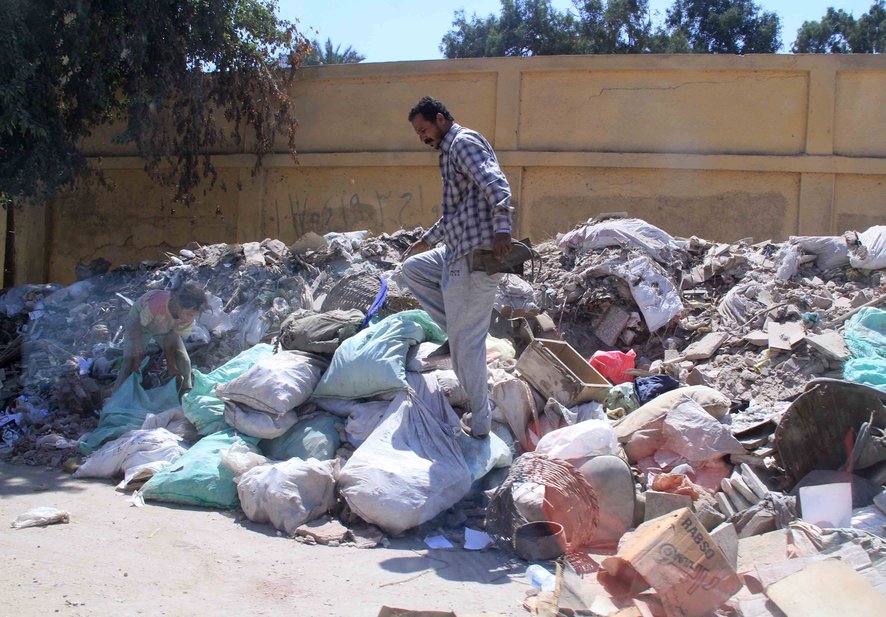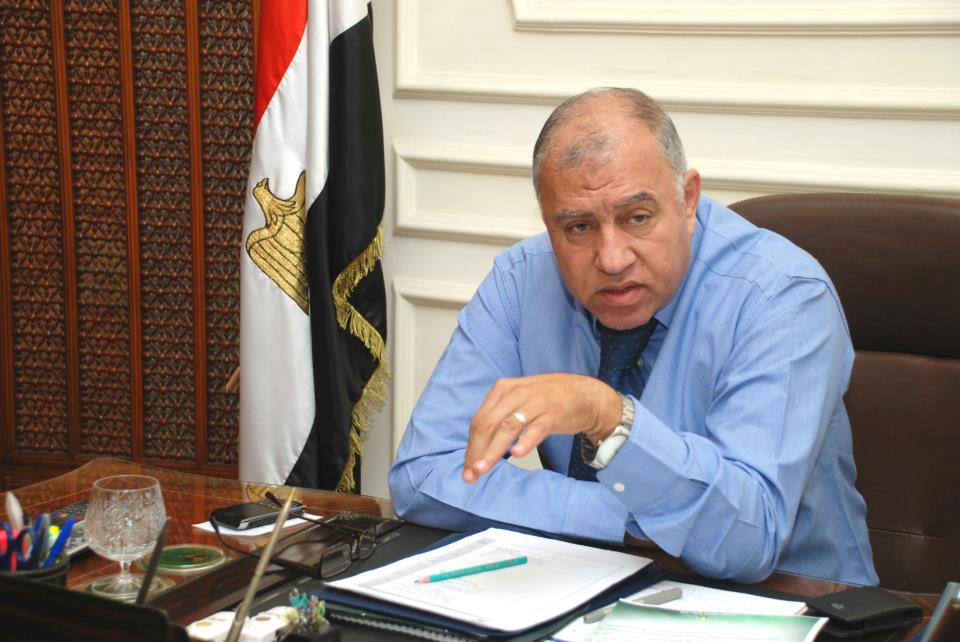CAIRO: Hours after an apology for the death of protesters across Egypt, the ruling military council said police did not attack and were only protecting the Ministry of Interior in Cairo.
General Mokhtar Al-Molla, member of the Supreme Council of the Armed Forces (SCAF), said police exercised “extreme self-restraint” while defending the ministry using only teargas in the face of pellets, Molotov cocktails and rocks aimed at them by infiltrators attempting to break in.
The clashes that occurred on Mohamed Mahmoud Street, which indirectly connects Tahrir Square with the ministry but is not the main road leading to it, left over 30 protesters dead.
Rights groups say that a total of 38 were killed in clashes between security and protesters across Egypt. Over 2,000 were injured.
"You can’t ask the Ministry of Interior to stand defenseless against an attack on its headquarters, it’s a matter of sovereignty," El-Molla told journalists at a press conference held to discuss final preparations for parliamentary elections scheduled for Monday.
He said riot police is allowed to use much more force than teargas.
Journalists were outraged by the comments saying, "We were there, we saw what happened" and "peaceful protesters were attacked while they were praying."
Al-Molla brushed off their objections while refuting the videos and pictures that flooded the media documenting the brutality used against peaceful protesters in the iconic square.
"Police and army are not angels, all accusations against them will be investigated," he said in response to an Amnesty International report citing police violations.
Political powers slammed SCAF for its statements saying that police committed flagrant violations.
"Police forces started the clashes when they violently attacked a small group of protesters in Tahrir on Saturday morning to evacuate the square," Mohamed Hamed, member of the political bureau of the Free Egyptians party, told Daily News Egypt.
The minister of health said a day earlier that at least seven died of live gunshot wounds. In addition to teargas suffocation, many injuries were a result of pellets and rubber bullets which were aimed at protesters’ eyes. Yet Al-Molla maintained that police only used teargas.
The general said that while people in Tahrir are not representative of all Egyptians, their opinions are respected by SCAF.
Challenged by one of the reporters on how pressure from protesters in Tahrir toppled Mubarak and forced SCAF to announce a clear date for presidential elections by the end of June 2012, much earlier than their earlier suggestion in 2013, Al-Molla replied, "Tahrir includes Egyptian patriotic youth who are expressing their opinion."
He added that those who were allegedly attacking the interior ministry were outsiders who do not represent peaceful protesters.
Most of the clashes occurred on Mohamed Mahmoud Street, blocks away from the street that would lead to the ministry headquarters. Police had stormed or fired teargas in Tahrir several times since the clashes broke out on Saturday.
"We have been hearing about these outsiders for months now. Why doesn’t SCAF or the interior ministry expose them?" leading member of the Freedom and Justice Party (FJP) and former MP, Mohamed El-Beltagi told Daily News Egypt.
Journalists asked repeatedly about the feasibility of holding elections in light of recent events, echoing concerns about securing the polling stations. But SCAF and the Supreme Electoral Commission (SEC) stressed that the elections would go on no matter what.
"We are willing to hold elections under any circumstances because it’s the salvation for the whole society," said head of SEC Abdel-Moez Ibrahim.
Ibrahim denied claims that over 300 judges have decided not to oversee the polls, saying that only 35 judges did so due to health reasons.
The elections will be secured by a coordinated effort between the interior ministry and military forces.
Al-Molla denied press reports quoting the interior minister as saying that he cannot guarantee the security of the electoral process. The general said those in Tahrir would assist security forces in the task, because it’s the main step towards democracy.
El-Beltagi and Hamed both agreed that the elections should not be postponed, adding that SCAF needed to end the violence in Tahrir before Monday.
Calm had returned to the square after five days of clashes.
Mahmoud Afify, spokesman of April 6 Youth Movement, who has been participating in the open sit-in since Saturday, voiced a different opinion.
"These elections mean nothing to the people in Tahrir," he said. "SCAF must hand over power to a presidential council.”
Listing achievements
General Mamdouh Shahin listed SCAF’s achievements since it took over power on Feb. 11 including amending the People’s Assembly and Shoura Council laws and issuing the political corruption law.
The latter was issued on Tuesday, only days before the parliamentary elections slated for Nov. 28.
Political powers complained that former members of the corrupt regime have already registered for the elections in a bid to dominate the PA. Shahin downplayed the delay, saying that if an elected MP is found guilty of political corruption by a court order after the elections, he will be expelled from the PA.
"We can’t deem someone guilty of political corruption without a court order," he said, stressing that the amended law respected human rights.
The SCAF generals and the SEC also said that allowing Egyptians abroad to vote as an achievement.
Lawyers had won a case in the Administrative Court last month obliging the SEC to do so after months of demonstrations by Egyptians abroad demanding this right.
Egyptian expats started voting on Wednesday and will continue to do so until Nov. 26 at 10 pm. The results will be announced on Nov, 28.
The head of SEC also said that the results of votes in the individual candidates system (accounting for one thirds of the seats) will be announced immediately while the results of votes on the closed party lists system will be announced after the three stages are complete in January.
Shahin pointed out several times that SCAF gained its legitimacy to rule the country from the Egyptian people through the March referendum on constitutional amendments.
However, Raafat Fouda, constitutional law professor at Cairo University, strongly disagreed. "There was nothing in March’s referendum so much as hinting anything related to SCAF’s authority," he said.
The main debate in the referendum was which would come first, parliamentary elections or drafting the constitution. A total of 77 percent voted yes to having parliamentary elections first.
Fouda slammed SCAF saying that this statement meant that claims that the military council gained its legitimacy from the people in Tahrir was a lie, since the generals believed it was derived from the referendum.
Field Marshal Hussein Tantawi had said in his speech on Monday night that SCAF was willing to hold a referendum on whether they should handover power immediately, if the people demanded so.
Fouda said that a referendum was not a democratic way of electing a ruler, comparing Tantawi to Mubarak.
"Tantawi is following in the footsteps of his father Mubarak who also used the referendum in securing his place as president," he said.
Many political and constitutional experts argued that this was an "unconstitutional step" as SCAF didn’t assume power through a referendum.
Regarding the military trials of civilians, Al-Molla reiterated previous SCAF statements stressing that no activists were tried for their opinions, only their actions.
Around 12,000 Egyptians have been tried in military courts since SCAF took over. Several journalists and activists were questioned by the military prosecution for statements they made or articles they wrote, including journalists and activists Rasha Azab, Hossam Al-Hamalawy and Asmaa Mahfouz.
Blogger Maikel Nabil was sentenced to three years for a writing a blog post criticizing the army; he was found guilty of spreading false news.


